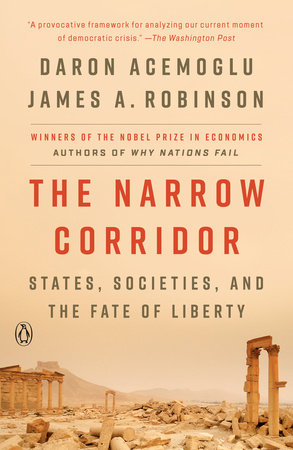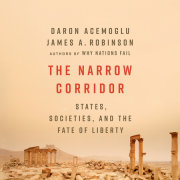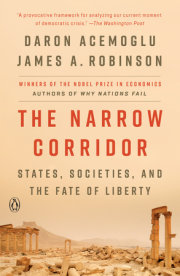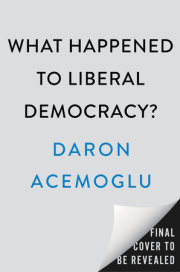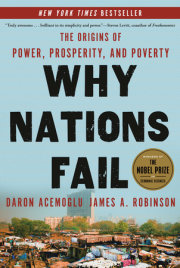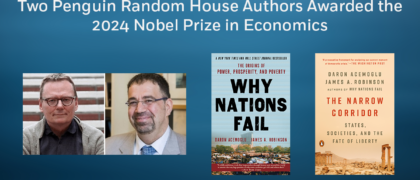Chapter 1
How Does History End?
A Coming Anarchy?
In 1989, Francis Fukuyama predicted the "end of history," with all countries converging to the political and economic institutions of the United States, what he called "an unabashed victory of economic and political liberalism." Just five years later Robert Kaplan painted a radically different picture of the future in his article "The Coming Anarchy." To illustrate the nature of this chaotic lawlessness and violence, he felt compelled to begin in West Africa:
West Africa is becoming the symbol of [anarchy] . . . Disease, overpopulation, unprovoked crime, scarcity of resources, refugee migrations, the increasing erosion of nation-states and international borders, and the empowerment of private armies, security firms, and international drug cartels are now most tellingly demonstrated through a West African prism. West Africa provides an appropriate introduction to the issues, often extremely unpleasant to discuss, that will soon confront our civilization. To remap the political earth the way it will be a few decades hence . . . I find I must begin with West Africa.
In a 2018 article, "Why Technology Favors Tyranny," Yuval Noah Harari made yet another prediction about the future, arguing that advances in artificial intelligence are heralding the rise of "digital dictatorships," where governments will be able to monitor, control, and even dictate the way we interact, communicate, and think.
So history might still end, but in a very different way than Fukuyama had imagined. But how? The triumph of Fukuyama's vision of democracy, anarchy, or digital dictatorship? The Chinese state's increasing control over the Internet, the media, and the lives of ordinary Chinese might suggest that we are heading toward digital dictatorship, while the recent history of the Middle East and Africa reminds us that a future of anarchy is not so far-fetched.
But we need a systematic way to think about all of this. As Kaplan suggested, let's begin in Africa.
The Article 15 State
If you keep going east along the West African coast, the Gulf of Guinea eventually turns south and heads to Central Africa. Sailing past Equatorial Guinea, Gabon, and Pointe-Noire in Congo-Brazzaville, you arrive at the mouth of the river Congo, the entry point to the Democratic Republic of the Congo, a country that is often thought to be the epitome of anarchy. The Congolese have a joke: there have been six constitutions since the country gained its independence from Belgium in 1960, but they all have the same Article 15. The nineteenth-century French prime minister Charles-Maurice Talleyrand said that constitutions should be "short and obscure." Article 15 fulfills his dictum. It is short and obscure; it says simply DŽbrouillez-vous (Fend for yourself).
It's usual to think of a constitution as a document that lays out the responsibilities, duties, and rights of citizens and states. States are supposed to resolve conflicts among their citizens, protect them, and provide key public services such as education, healthcare, and infrastructure that individuals are not able to adequately provide on their own. A constitution isn't supposed to say DŽbrouillez-vous.
The reference to "Article 15" is a joke. There isn't such a clause in the Congolese Constitution. But it's apt. The Congolese have been fending for themselves at least since independence in 1960 (and things were even worse before). Their state has repeatedly failed to do any of the things it is supposed to do and is absent from vast swaths of the country. Courts, roads, health clinics, and schools are moribund in most of the country. Murder, theft, extortion, and intimidation are commonplace. During the Great War of Africa that raged in the Congo between 1998 and 2003, the lives of most Congolese, already wretched, turned into a veritable hell. Possibly five million people perished; they were murdered, died of disease, or starved to death.
Even during times of peace the Congolese state has failed to uphold the actual clauses of the constitution. Article 16 states:
All persons have the right to life, physical integrity and to the free development of their personality, while respecting the law, public order, the rights of others and public morality.
But much of the Kivu region, in the east of the country, is still controlled by rebel groups and warlords who plunder, harass, and murder civilians while looting the country's mineral wealth.
What about the real Article 15 in the Congolese Constitution? It begins, "The public authorities are responsible for the elimination of sexual violence . . ." Yet in 2010 an official of the United Nations described the country as the "rape capital of the world."
The Congolese are on their own. DŽbrouillez-vous.
A Journey Through Dominance
This adage is not apposite just for the Congolese. If you retrace the Gulf of Guinea, you arrive at the place that seemed to best sum up Kaplan's bleak vision of the future, Lagos, the business capital of Nigeria. Kaplan described it as a city "whose crime, pollution, and overcrowding make it the clichŽ par excellence of Third World urban dysfunction."
In 1994, as Kaplan wrote, Nigeria was under the control of the military with General Sani Abacha as president. Abacha did not think that his job was to impartially resolve conflicts or protect Nigerians. He focused on killing his opponents and expropriating the country's natural wealth. Estimates of how much he stole start at around $3.5 billion and go higher.
The previous year the Nobel Prize-winning writer Wole Soyinka returned to Lagos, crossing the land border from Cotonou, the capital of neighboring Benin (which is shown on Map 1). He recalled, "The approach to the Nigeria-Cotonou border told the story at first glance. For miles we cruised past a long line of vehicles parked along the road right up to the border, unable or unwilling to cross." People who ventured across "returned within an hour of their venture either with damaged vehicles or with depleted pockets, having been forced to pay a toll for getting even as far as the first roadblock."
Undeterred, Soyinka crossed into Nigeria to find somebody to take him to the capital, only to be told, "Oga Wole, eko o da o" (Master Wole, Lagos is not good). A taxi driver came forward pointing to his bandaged head with his bandaged hand. He proceeded to narrate the reception he had received; a bloodthirsty gang had pursued him even as he drove his car in reverse at full speed.
Oga . . . Dose rioters break my windshield even as I dey already reversing back. Na God save me self . . . Eko ti daru [Lagos is in chaos].
Finally, Soyinka found a taxi to take him to Lagos, though the reluctant driver opined, "The road is ba-a-ad. Very bad." As Soyinka put it, "And thus began the most nightmarish journey of my existence." He continued:
The roadblocks were made up of empty petroleum barrels, discarded tires and wheel hubs, vending kiosks, blocks of wood and tree trunks, huge stones . . . The freelance hoodlums had taken over . . . At some roadblocks there was a going fee; you paid it and were allowed to pass-but that safe conduct lasted only until the next barrier. Sometimes the fee was a gallon or more of fuel siphoned from your car, and then you were permitted to proceed-until the next barrier . . . Some vehicles had clearly run a gauntlet of missiles, cudgels, and even fists; others could have arrived directly from the film set of Jurassic Park-one could have sworn there were abnormal teeth marks in the bodywork.
As he approached Lagos, the situation grew worse.
Normally the journey into the heart of Lagos would take two hours. Now it was already five hours later, and we had covered only some fifty kilometers. I became increasingly anxious. The tension in the air became palpable as we moved nearer to Lagos. The roadblocks became more frequent; so did the sight of damaged vehicles and, worst of all, corpses.
Corpses are not an unusual sight in Lagos. When a senior policeman went missing, the police searched the waters under a bridge for his body. They stopped looking after six hours and twenty-three corpses, none of them the one they were seeking.
While the Nigerian military looted the country, Lagosians had to do a lot of fending for themselves. The city was crime ridden and the international airport was so dysfunctional that foreign countries banned their airlines from flying there. Gangs called "area boys" preyed on businessmen, shaking them down for money and even murdering them. The area boys weren't the only hazard people had to avoid. In addition to the odd corpse, the streets were covered in trash and rats. A BBC reporter commented in 1999 that "the city is . . . disappearing under a mountain of rubbish." There was no publicly provided electricity or running water. To get light you had to buy your own generator. Or candles.
The nightmarish existence of Lagosians wasn't just that they lived in rat-infested, trash-strewn streets and saw corpses on the sidewalk. They lived in continual fear. Living in downtown Lagos with the area boys wasn't fun. Even if they decided to spare you today, they might come after you tomorrow-especially if you had the audacity to complain about what they were doing to your city or didn't show them the subservience they demanded. This fear, insecurity, and uncertainty may be as debilitating as actual violence because, to use a term introduced by political philosopher Philip Pettit, it puts you under the "dominance" of another group of human beings.
In his book Republicanism: A Theory of Freedom and Government, Pettit argues that the fundamental tenet of a fulfilling, decent life is non-dominance-freedom from dominance, fear, and extreme insecurity. It is unacceptable, according to Pettit, when one has to
live at the mercy of another, having to live in a manner that leaves you vulnerable to some ill that the other is in a position arbitrarily to impose.
Such dominance is experienced when
the wife . . . finds herself in a position where her husband can beat her at will, and without any possibility of redress; by the employee who dare not raise a complaint against an employer, and who is vulnerable to any of a range of abuses . . . that the employer may choose to perpetrate; by the debtor who has to depend on the grace of the moneylender, or the bank official, for avoiding utter destitution and ruin.
Pettit recognizes that the threat of violence or abuses can be as bad as actual violence and abuses. To be sure, you can avoid the violence by following some other person's wishes or orders. But the price is doing something you don't want to do and being subject to that threat day in and day out. (As economists would put it, the violence might be "off the equilibrium path," but that doesn't mean that it doesn't affect your behavior or have consequences that are almost as bad as suffering actual violence.) As Pettit sees it, such people
live in the shadow of the other's presence, even if no arm is raised against them. They live in uncertainty about the other's reactions and in need of keeping a weather eye open for the other's moods. They find themselves . . . unable to look the other in the eye, and where they may even be forced to fawn or toady or flatter in the attempt to ingratiate themselves.
But dominance doesn't just originate from brute force or threats of violence. Any relation of unequal power, whether enforced by threats or by other social means, such as customs, will create a form of dominance, because it amounts to being
subject to arbitrary sway: being subject to the potentially capricious will or the potentially idiosyncratic judgement of another.
We refine Locke's notion and define liberty as the absence of dominance, because one who is dominated cannot make free choices. Liberty, or in Pettit's words, non-dominance, means
emancipation from any such subordination, liberation from any such dependency. It requires the capacity to stand eye to eye with your fellow citizens, in a shared awareness that none of you has a power of arbitrary interference over another.
Critically, liberty requires not just the abstract notion that you are free to choose your actions, but also the ability to exercise that freedom. This ability is absent when a person, group, or organization has the power to coerce you, threaten you, or use the weight of social relations to subjugate you. It cannot be present when conflicts are resolved by actual force or its threat. But equally, it doesn't exist when conflicts are resolved by unequal power relations imposed by entrenched customs. To flourish, liberty needs the end of dominance, whatever its source.
In Lagos liberty was nowhere to be seen. Conflict was resolved in favor of the stronger, the better-armed party. There was violence, theft, and murder. Infrastructure was crumbling at every turn. Dominance was all around. This was not a coming anarchy. It was already there.
Warre and the Leviathan
Lagos in the 1990s may seem an aberration to most of us living in security and comfort. But it isn't. For most of human existence, insecurity and dominance have been facts of life. For most of history, even after the emergence of agriculture and settled life about ten thousand years ago, humans lived in "stateless" societies. Some of these societies resemble a few surviving hunter-gatherer groups in the remote regions of the Amazon and Africa (sometimes also called "small-scale societies"). But others, such as the Pashtuns, an ethnic group of about 50 million people who occupy much of southern and eastern Afghanistan and northwestern Pakistan, are far larger and engaged in farming and herding. Archaeological and anthropological evidence shows that many of these societies were locked in an even more traumatic existence than the inhabitants of Lagos suffered daily in the 1990s.
The most telling historical evidence comes from deaths in warfare and murder, which archaeologists have estimated from disfigured or damaged skeletal remains; some anthropologists have observed this firsthand in surviving stateless societies. In 1978, the anthropologist Carol Ember systematically documented that there were very high rates of warfare in hunter-gatherer societies-a shock to her profession's image of "peaceful savages." She found frequent warfare, with a war at least every other year in two-thirds of the societies she studied. Only 10 percent of them had no warfare. Steven Pinker, building on research by Lawrence Keeley, compiled evidence from twenty-seven stateless societies studied by anthropologists over the past two hundred years, and estimated a rate of death caused by violence of over 500 per 100,000 people-over 100 times the current homicide rate in the United States, 5 per 100,000, or over 1,000 times that in Norway, about 0.5 per 100,000. Archaeological evidence from premodern societies is consistent with this level of violence.
Copyright © 2020 by Daron Acemoglu. All rights reserved. No part of this excerpt may be reproduced or reprinted without permission in writing from the publisher.

